PUBLISHER: R. Worthington & Co., New York, 1867-1885; Worthington Company, New York, 1885-1893
ABOUT: "The American book trade, with all its opportunities for innovation and specialization, lured young men with dreams of big rewards in journalism or publishing. Both before and after the Civil War many Canadians made important contributions to mass market publishing.… Richard Worthington, who left Montreal in the late sixties after being involved in bookselling and publishing, had a rather dubious reputation as a New York publisher in the 1870s." --George L. Parker, The Beginnings of the Book Trade in Canada (University of Toronto Press, 1985), p.161. [See DeWolfe Fiske & Co. for another publisher Parker sites.]
Started in Montreal and Boston, moved to 750 Broadway in 1874; 28 Lafayette Place 1876, then to 770 Broadway (DLB 49). ... The Worthington publications were mainly sets of standard writers, twelvemos of popular and standard works, and juveniles. The catalog prices placed on these books were not particularly low, but as was so often the case with this type of publication, especially during the 1880s, the actual selling price was much less than the advertised price. Standard twelvemos listed at one dollar, and complete sets listed at somewhat over a dollar a volume sold for much less.... In 1882 Worthington purchased more than a hundred and fifteen thousand cloth-bound "standards" from John W. Lovell, who had decided to give up this type of publishing. It was reported that "This purchase, aggregating in retail prices about $150,000, is a most extraordinary event in the history of the New York booktrade" [Publishers' Weekly 21:195 (1882)].
The location information from DLB and elsewhere below in this headnote is incorrect. In fact, Worthington (1834-1894) established (perhaps purchased an already established) stationary store in Montreal about
In 1884 Worthington bought the remainder of the Lovell company's books, "all their standard sets of books, red-line poets--etc., except the Lovell Library" [Publishers' Weekly 25:191 (1884)]. These sets of George Eliot, Thackery, Dickens, Scott, and othrs, purchased at a low price, furnished good material for price cutting. / In 1889 when a proposed "combination" of cheap book publishers was being discussed, Mr. Worthington was in favor of it. Said he, "You see we've all got a lot of dead property on our hands in these plates. This concern alone has $300,000 worth. As long as the present demoralized condition of things exist growing out of reckless competition this property is valueless. [New York Herald July 7, 1889, p21]. [Worthington was not correct in this: his competitors bought the plates for virtually nothing, enabling them to print and market copies at prices that undercut Worthington's own very low prices, thus making the stock he had bought near valueless -- one of the prncipal causes of his financial collape in 1893].
In 1885 R. Worthington & Co. "was compelled to make an assignment ... for the benefit of his creditors." The company was held by Worthington himself, supported by a relatively small group of investors and creditors (e.g., printers, binders, auctioneers), and its oblgations substantially exceeded its income and assets easily converted to cash. Worthington offered the investors and creditors a sequence of delayed payments over three years, with no interest, which allowed him to continue the business. Nonetheless, by mid-summer Worthington had converted the business to a joint stock company renamed "The Worthington Company," a move which increased flexibility in some respects but brought with it additonal legal requirements.
In early 1893 The Worthington Company failed financially and Richard Worthington asked for a court-appointed Receiver to sort out assets and liabilities, using assets to arrange payment at least a portion of their investment to investors in the company. Another publisher, J. J. Little, agreed to accept this role. Receivers were normally lawyers, usually with knowledge of corporate law, and it was unusal for a judge to appoint a person who had long experience in same field as the failed company. In doing so, the judge hoped the Receiver would be to continue the business for a time or, at least, to dispose of assets in a way designed to maximize their value, hence enhancing investor compensation. Little took his responsibilities seriously and found evidence of sensational fraud. Publishers' Weekly followed closely the continuing saga of legal actions and Richard Worthington's personal fortunes through 1894. This story is fully captured on an adjoining page, The Failure of The R. Worthington Company. One consequence was a public auction of the reprint Company's stereoplates, a well attended event, following which Publisher's Weekly published a full inventory with prices realized, a rare opportunity to observe the dollar values which quality plate sets could fetch in this period.
[Report in Publishers’ Weekly 45:1162, May 5, 1894, p684.] --MR WORTHINGTON DISCHARGED. -- Richard Worthington was arraigned in the Tombs Court on Friday, April 27, on complaint of Joseph J. Little, receiver, who charged him with perjury. He furnished bail for examination on Tuesday, May 1. Justice Martin in the Tombs Court on that day discharged Mr. from custody.
[The American Newsman II:5 (May 1894), p14]. --At the Worthington sale J. J. Little, receiver of the Worthington Co., submitted to Mr. Anthony Comstock some book which he was told Mr. Comstock had restrained Mr. Worthington from selling some ten years back, and submitted to the court the question whether he had any right to sell as assets of the company books that had been put under Mr. Comstock's ban. In looking over these forbidden books, Mr. Comstock for the first time glanced into the pages of "Tom Jones," and is shocked to think that this book has been sold for one hundred and forty-five years. In future he will do his best to check its sale. Gibbon, Thackeray, and Coleridge held different opinions about "Tom Jones," hut they are only immortal critics and -- had read the book.
[Publishers’ Weekly 46:1185, October 13, 1894, p584.] OBITUARY NOTES. --RICHARD WORTHINGTON died suddenly before midnight of Sunday, the 7th inst., at his home in Sea Cliff, L. I. He had for some time been treated for diabetes, which, aggravated by the worry of the past six months, no doubt hastened his death. He appeared to be in good health on Sunday, and attended church in the evening. He retired about eleven o'clock, but got up again, complaining of a suffocating sensation. His wife and Miss Sproule were present, and the latter went for Dr. Zabriskie, of Glen Cove but on their return found that Mr. Worthington was dead. When the United States Book Company was formed in 1890 it took over a considerable part of the Worthington stock, including the Franklin Edition of popular twelvemos, and the cloth-bound World Library. When the United States Book Company failed, much of the stock came back again into the hand of Worthington. / In January 1885, the Publishers' Weekly reported that one of the chief failures of the previous year was "that of the Worthington Company, which put to an end a business that had long been a source of demoralization in the trade" [Publishers' Weekly 47:7 (1895)]. (Shove).
See Tools [tab on ribbon above] for citation to Stern article and an 1883 biography and portrait.
LUCILE’s ISSUED BY R. Worthington & Co.: Index of editions of Lucile:
Alligator (leather), 1886;
Apple Blossom (embossed leather), 1888-1892;
Arundel (cloth), 1881-1887;
Arundel (cloth), same, gilt and gilt edges, 1888;
Arundel Quartos (cloth), 1884;"Beautifully Illustrated" (cloth), 1883-1892;
Caxton Library (cloth), 1881-1883;
Franklin (cloth), 1887-1892;
Household (cloth), 1885-1889;
Lovell's Red Line (cloth), 1880-1884;
New Red Line (cloth), 1885-1887, 1889-1892;
Pine and Bamboo (embossed leather), 1887-1889;
Presentation (cloth), 1885-1892;
Rosebud (leather), 1888-1889;
World Library (cloth), 1890;
Worthington's Eureka Edition (cloth), 1882;
Worthington's Octavos (cloth), 1890-1891.
Index of editions of Meredith's Poetical Works: Alligator, 1886;
Arundel, 1881-1888;
Arundel. (same, gilt and gilt edges), 1888;
Caxton Library, 1881-1883;
Lovell's Red Line, 1880-1884;
New Red Line, 1885-1890;
Worthington's Editions in Morocco and Half Russia, 1882;Worthington's Eureka Edition, 1882.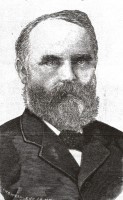
Richard Worthington in 1883
Engraved by Robert Washington Shoppell
for Biographer (New York) 1:1 1883)
Mr. Worthington was born 1834 in Preston, Lancashire, England. His father was a merchant of comfortable means, and gave his son a good education. When eighteen years old young Worthington entered the grain business, and after pursuing this occupation for eight years emigrated to Canada and settled in Montreal, where for a time he continued the grain and subsequently a commission business, without much profit, however. Encouraged by a friend, he bought a book and stationery store in Montreal in 1861. His first venture in publishing occurred about this time, and was a "History of the Province of Canada." which had a wide circulation. Mr. Worthington, however, devoted the most of his attention to the stationery trade, which in a few years grew to considerable proportions.
Encouraged by his success he established a branch in Boston in 1867, which in time absorbed all his attention and he gave up his Montreal business. In Boston the character of his business changed altogether, and henceforth he made the sale of standard English books his specialty. In 1874 be opened a branch house at 750 Broadway, to which he removed altogether in I876, after having failed in Boston. At this time Mr. Worthington had one of the largest and most carefully selected stocks of rare English books that could be found in New York City.
From January, 1885 (in which year he formed the R. Worthington Co., and since which he occupied successively the stores at 770 Broadway, 28 Lafayette Place, and 747 Broadway), to January, 1893, Mr. Worthington's business career was marked, and finally closed in a failure, the details of which are still fresh in the mind of the trade. Mr. Worthington was always more of a bookseller than a publisher, and preferred to purchase an entire edition of a new English publication rather than to assume the copyright of it on his own account. He was the importer of the English edition of “Chambers' Encyclopedia" and he also introduced other standard works of reference. He was a man of vast schemes, which, owing to lack of capital and loose calculations, invariably ended in shipwreck.
Reported copies of Lucile are presented in alphabetical order of series names:
Alligator (leather), 1886
Apple Blossom (embossed padded leather), 1888-1892
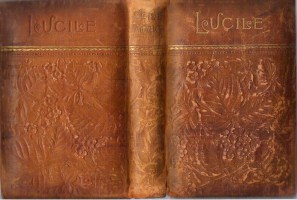
Arundel (cloth), 1881-1888; Arundel Quartos (cloth), 1884. See also Arundel Printing & Publishing: Apart from name, page count (369p) and size -- the Arundel volumes are a few millimeters taller -- these volumes share no other characteristics. They are printed from entirely different plates, Arundel within red line pages and Worthington's within elaborate, black, borders. Worthington has his copyright notice on the verso of his title pages; and the bindings differ considerably. The red line copies are probably stock acquired from Lovell in 1884.
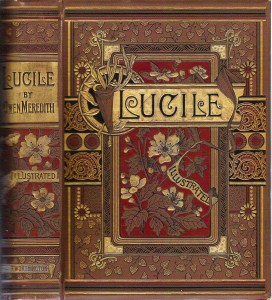
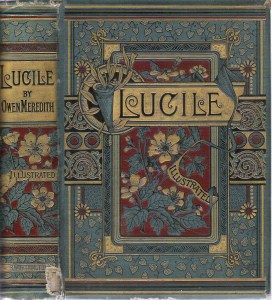
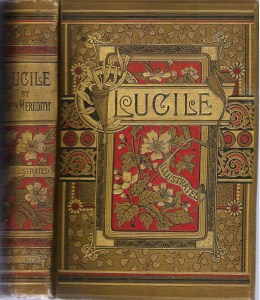
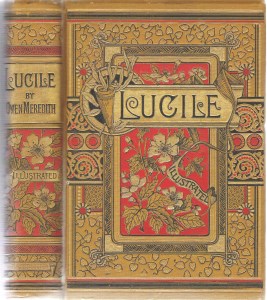
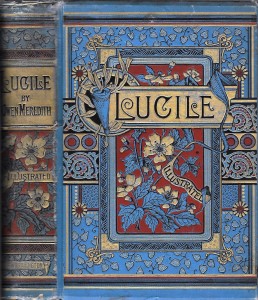
Caxton Library (cloth), 1881-1883. This was one of several Lovell series taken over by Worthington in 1883. Worthington probably did not bother to change title pages for already bound stock -- and their may have been no unbound stock -- hence no copies have turned up with the Worthington imprint.
Franklin (cloth), 1887-1892
Household (cloth), 1885-1889
Lovell's Red Line (cloth), 1880-1884. Another of the series taken over by Worthington in 1883.
Moxon's Popular Poets, 1883. [Worthington's catalogs give no indication of a relationship with Ward, Lock & Co. so this edition is a puzzle. Ward, Lock & Co. began publishing in London in 1854. In 1870, it acquired E. Moxon Son & Co., taking over that firm's extensive relationships with British writers. In 1882, expanding to other English-speaking countries, it opened a New York City office. In 1883 Lucile was still very much under English copyright, and Lord Robert Lytton still alive, so it seems highly unlikely Ward, Lock would have planned or published Lucile in England or any colonial market. The ever enterprising Worthington may have contracted with Ward, Lock to provide stamped cases (though it is puzzling why he would not then have requested a Worthington notice on the spine). The binding has a distinctly American ("French") groove suggesting American, rather than English, production. Worthington did have a set of 369 page electro-types (used on the Arundel, "Beautifully Illustrated," and some Red Line editions). Perhaps the Moxon series was so well known to book buyers that Worthington expected to gain some cachet by "borrowing" the labeling.]
New Red Line (cloth), 1885-1887, 1889-1892. [A guess this: the New Red Line series is not pictured in PTLA.]
Pine and Bamboo (embossed leather), 1887-1889
Presentation (cloth), 1885-1892. [A guess this: the Presentation series is not pictured in PTLA.]
Rosebud (leather), 1888-1889
World Library (cloth), 1890
Worthington's Eureka Edition (cloth), 1882
Worthington's Octavos (cloth), 1890-1891
Reported copies of Meredith's Poetical Works are presented in alphabetical order of series names:
These are probably "New Red Line" editions (since no Household Edition of the Works is reported), but Worthington's assignment of books to series is not well understood at this time.
PTLA Descriptions:
1880 PTLA: Poets. R. Worthington respectfully calls the attention of the trade to the fact that the following is the complete list of the the only Genuine "Lansdowne Poets" with the addition of three of his own manufacture, viz., Nos. 1,2, and 3, which are equal in every respect to the other vols. of the series. The trade will, therefore, be careful in ordering from other catalogues under this, or a similar title. [Under general heading, The Lansdowne Poets (27 titles); Lovell's Red Line. New Edition. 12mo, full gilt side and back, gilt edges, Each $1.25. (38 titles, including Works and Lucile; and Warne's Popular Poets (29 titles)].
1881 PTLA: Caxton Library. 12mo, cloth, gilt. 1.00 [includes Works and Lucile]. Poets, The Lansdowne [Lovell as 1880, offering Lucile only]. Poets-- Arundel. Complete Editions. Handsome volumes, large 12mo. cloth, extra gilt. 1.25. The same, gilt and gilt edges, 1.50. [Both Works and Lucile].
1882 PTLA: Caxton Library as 1881. Lovell's Red Line as 1881. Arundel offers only Works.
----. Worthington's Editions of the Poets in Morocco and Half Russia Bindings. These are, without doubt, the finest editions of the Poets ever issued in this country at a low price. The plates are all new, beautiful clear type, the paper very good, and the binding the best and handsomest that could be designed. In most cases, the works will be found more complete than the foreign edition; on account of the copyright on many of the poems not having yet expired, the English publishers are prevented from printing all the poems of many of the best authors. Red line editions. In fine bindings. 12mo. size, per volume bound in full morocco, extra, with gilt stamp and gilt edges. / Or in half russia, extra, with handsome gilt tooling on back, and marbled edges. [Only Works offered].
----. Worthington's Eureka Edition of the Poets. This edition of the Poets is of the most convenient 12mo size, is beautifully printed with Oxford red lines, on extra fine paper, elegantly bound in cloth, gilt, and altogether the most complete edition of these poets published. Cloth gilt extra, gilt edges. $1.25. / Cloth extra, plain edges. $1.00. [Offers Works and Lucile].
1882 September 23 PW: ad includes "The Caxton Library, 12mo, cloth, gilt, $1 per vol.," offering both Works and Lucile.
1883 PTLA: Caxton Library as 1881; Lovell's Red Line as 1881. 1884 PTLA: Meredith's Lucile as 1883. Lovell's Red Line as 1881. Arundel as 1882.
R. Worthington Co., renamed the Worthington Company, relocated to 747 Broadway in 1885. The firm had several legal battles with censor/reformer Anthony Comstock.
1885 PTLA: "Beautifully Illustrated" reduced to $3.75; [Same as?:] Poets
---- Presentation Edition. Beautifully printed, and illustrated with full-page engravings. 4to, cloth, gilt extra, gilt edges, each. $3.75. / Red Line as 1881 [cut, but not described as Lovell's]; Arundel as 1882. 1886 PTLA: "Beautifully illustrated"; Red Line; Household; Arundel; and Presentation as 1884. 1887 PTLA: "Beautifully illustrated"; Red Line; Household; Presentation; and Arundel as earlier. [Red Line?], 1887.
1888 PTLA: Beautifully illustrated; Franklin; New Red Line; Pine and Bamboo; Apple Blossom; Household; Arundel; and Presentation as earlier. 1889 PTLA: Beautifully Illustrated; Franklin [cut]; Rosebud; Pine and Bamboo; Apple Blossom (described as half calf, gilt extra); Household; and Presentation editions as earlier. 1889 PW Christmas Bookshelf: address 747 B'way. Among Worthington Company's new publications, Lucile "illustrated with full-page engravings. 4to, cloth, gilt extra, gilt edges, $3.75."
Literary World (Boston) 20:447 (December 7, 1889), p447, Worthington Company advertisement: Worthington Company’s New Publications…. Lucile. Meredith’s (Owen) Illustrated with full-page engravings. 4to, cloth, gilt extra, gilt edges. $3.75.
1890 PTLA: Franklin; Beautifully Illustrated; New Red Line; Apple Blossom; Household; Presentation editions as earlier. 1891 PTLA: Franklin; Beautifully illustrated; New Red Line; Apple Blossom; Household; Presentation; and Worthington's Octavos as earlier.
Last revised: 22 December 2024 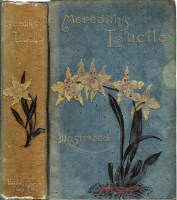
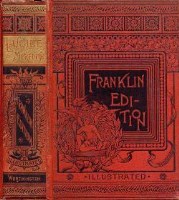
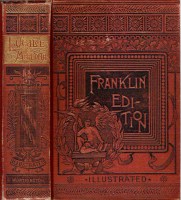
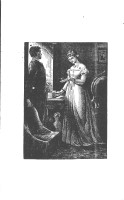
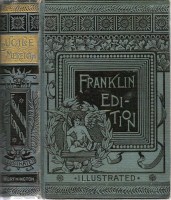
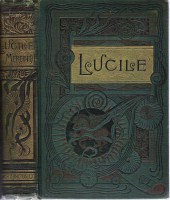
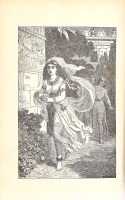
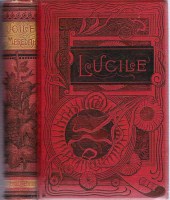
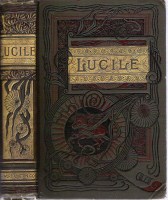
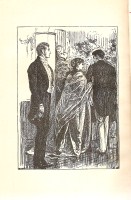
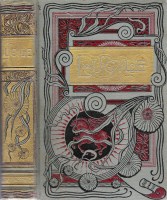
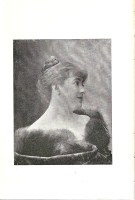
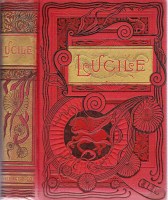
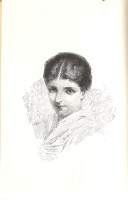
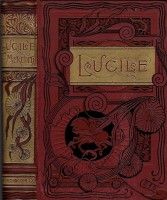
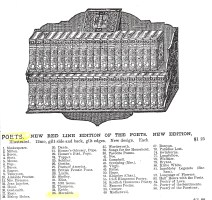
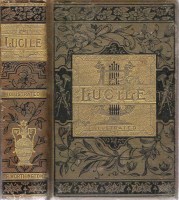
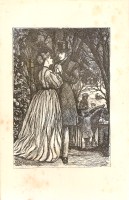
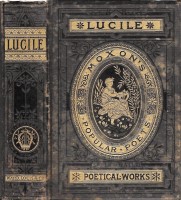
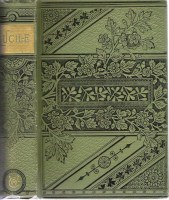
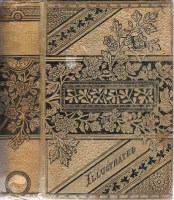
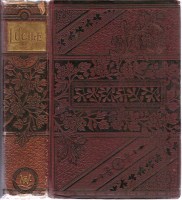
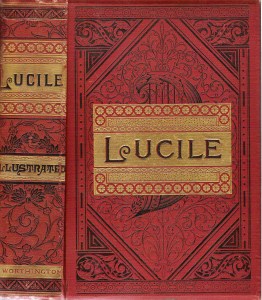
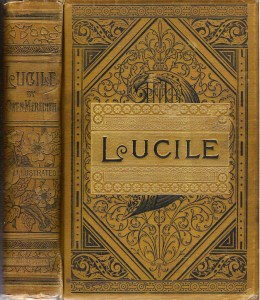
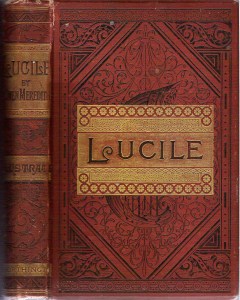
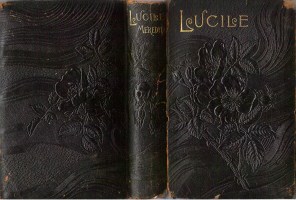
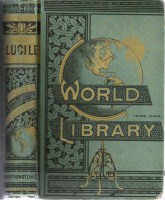
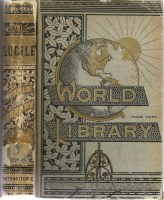
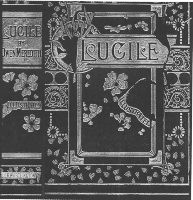
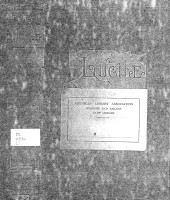
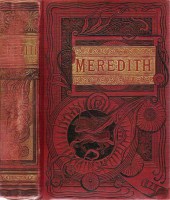
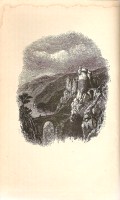
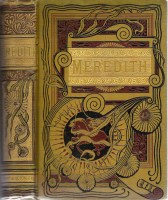
----. Meredith's Lucile. Beautifully illustrated with full-page engravings and in Red Line. 4to, gilt extra, gilt edges. $5.00.
----. Poets - Arundel. Complete Editions. Handsome volumes, large 12mo, cloth, extra gilt. 1.25. / The same, gilt and gilt edges. [Works and Lucile].
----. Arundel Quartos. Beautifully printed, and illustrated with full-page engravings. 4to, cloth, gilt extra, gilt edges, each 5.00. [Lucile only].
----Household Edition of the Red Line Poets. 12mo, cloth, gilt, plain edges. 1.25. [Lucile only].
----.Alligator Edition of the Poets. Red-line edition. Beautifully illustrated and bound in fancy alligator, padded, gilt edges, and boxed, each $2.00. [Both Works and Lucile].
----. Franklin Edition Popular 12mos. Printed in large, clear type, illustrated and handsomely bound, black and gold. Price, each $1.00. [Lucile only].
----. Pine and Bamboo Edition. Embossed Leather binding of new and rich design. $3.00. [Lucile only].
----. Apple Blossom Edition. Embossed leather binding in gold and colors. New design. $2.50. [Lucile only].
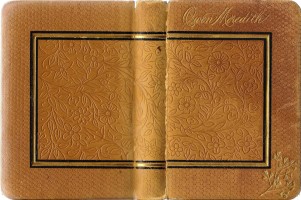
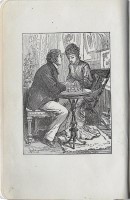
----. Rosebud Edition. (New design). $3.00. These entirely new designs in Leather Bound Poets are thoroughly artistic, and everything has been done to make them not only the prettiest but the cheapest books of the kind in the market.
----. Lucile, Meredith's (Owen). Illustrated with full-page engravings, 4to, cloth, gilt extra, giit edges, $3.75. [Worthington Company new publications advertisement, Publishers' Weekly926 (1889-10-26) p612].
----. LUCILE (Meredith's), nom de plume for Lord Lytton, has an eye for color, his ear is open for the cries of nature, he feels the hush of noon and the silence of midnight, and that, while he thinks clearly and feels deeply, he can express with rare facility and power.
----. World Library. [Includes Lucile].
----. Worthington's Octavos. Beautifully printed and illustrated by the best artists. 8vo, cloth, gilt extra. $3.00 / Sheep, marbled edges, $4.00. [Includes Lucile].